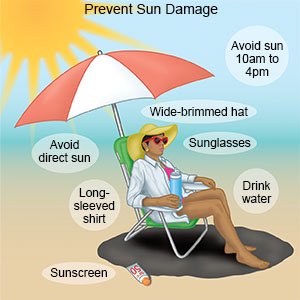Skin Cancer Prevention
Medically reviewed by Drugs.com. Last updated on Aug 4, 2025.
What do I need to know about skin cancer?
Skin cancer is the most common type of cancer. Anyone can get skin cancer. Your risk is increased if you have light colored hair, skin, or eyes. Tanning, a sunburn, or a lot of sun exposure can also increase your risk.
 |
What are general skin cancer prevention guidelines to follow?
- Avoid sun exposure between 10am and 4pm. The sun is most intense during the middle of the day.
- Sit in the shade if you are outside. Sit under an umbrella or sun shelter.
- Do not use tanning beds. Tanning beds are not safer than a tan directly from the sun.
- Check your skin regularly. Monitor your moles for any changes such as size, shape, or color. Changes may be an early sign of skin cancer. Talk to your healthcare provider if you notice a change.

How do I use sunscreen correctly?
- Use a broad spectrum sunscreen with at least SPF 30. Apply it 20 minutes before you go outside. Use sunscreen on cloudy days as well. Apply sunscreen at least every 2 hours and after you swim or sweat. Apply to your ears, scalp, back of your hands, and the tops of your feet. These areas are easily forgotten. Use a lip balm that contains at least SPF 30.
- Check the expiration date on your sunscreen. Sunscreens are not as effective after 3 years. Store sunscreen in a cool place. Sunscreen can expire sooner if kept in a hot environment.
What do I need to know about wearing protective clothing outdoors?
- Wear long-sleeved shirts and long pants or skirts. Choose dark colors and fabric with a tight weave. Some clothes have an ultraviolet protection factor (UPF) built in. Wear clothes with a UPF of 40 or higher.
- Wear a hat with a wide brim all the way around. The wide brim shades your face, ears, and the back of your neck. If possible, choose a dark-colored hat.
- Wear large-framed sunglasses. Sunglasses protect your eyes. Sunglasses decrease your risk for cataracts and other eye damage caused by the sun. Sunglasses that wrap around the sides of your face work best to keep out the sun.
Care Agreement
You have the right to help plan your care. Learn about your health condition and how it may be treated. Discuss treatment options with your healthcare providers to decide what care you want to receive. You always have the right to refuse treatment. The above information is an educational aid only. It is not intended as medical advice for individual conditions or treatments. Talk to your doctor, nurse or pharmacist before following any medical regimen to see if it is safe and effective for you.© Copyright Merative 2025 Information is for End User's use only and may not be sold, redistributed or otherwise used for commercial purposes.
Further information
Always consult your healthcare provider to ensure the information displayed on this page applies to your personal circumstances.
